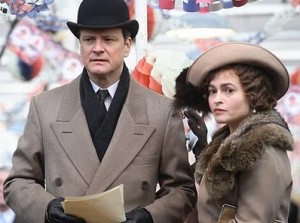

By Noah Forrest Forrest@moviecitynews.com
The King’s Speech was fine, I guess…but Best Picture, really?
I was pretty shocked when I read that The King’s Speech had gotten the most nominations (12) at the Oscars this year. For me, it was really nothing more than a middling film that I felt like I had seen countless times before: poor little rich prince needs to overcome hurdles in order to succeed. But this time, it seemed like the hurdle was fairly silly. I don’t mean to belittle folks who have speech impediments, as I understand that they can make life difficult for those who suffer from those afflictions, but it’s not like the guy was dealing with a fatal disease or anything. The fact that King George VI stammered is a sad foot-note, I suppose, but it’s hard for me to really get behind the guy in a meaningful way when I know that the stakes are not that high. World War II and Adolf Hitler are sort of looming in the background, but I’m not really that terrified that the future safety of the planet is at stake just because one of the tangential figures involved in that war had a speech impediment.
I really enjoyed the performances of the cast for the most part, but I was fairly underwhelmed by Colin Firth’s portrayal of the titular king. It’s not that he didn’t do a good job stammering, but rather that I didn’t feel like I knew him all that well by the end of the film. It’s partly the fault of the script, but what do I really know about this man besides the fact that he has a speech impediment? The script keeps telling me he’s noble and Geoffrey Rush’s character tells him that “he’s the bravest man” he’s ever met, but why exactly is he brave? It seems like he’s quite willing to walk away from therapy and help several times throughout the film because it doesn’t suit his royal blood to discuss trivial matters with his therapist. That doesn’t really strike me as bravery. Also, Firth comes off as being whiny quite often in his therapy sessions, which doesn’t fit into my definition of “brave.”
I thought Rush and Helena Bonham Carter were good, as they almost always are. Guy Pearce seemed to relish playing the caddish older brother. But the film as a whole didn’t really feel all that vital to me. When we finally get the speech at the end, it’s really not such a great speech. So, we’re just supposed to look at this as a victory because he didn’t stutter much, but what about the content of the speech? It’s another example of the film telling me to feel something because other characters feel it rather than making me feel that emotion.
There is also a decided lack of tension in the film, even if you don’t know the history of what happened, because there’s no other possible way for the film to end. Every single time Firth and Rush part ways, we know they are going to come together again to finish out the therapy session because the film is firmly entrenched in a certain genre with a certain plot. The subplots don’t inform the characters any more than when we first meet them, there is no great change besides the speech of one particular character, and the film slowly comes to the only logical conclusion. Some films are about seeing the puzzle pieces come together in the way that you imagine it, but there are no puzzle pieces here, there is nothing to put together. If you hadn’t seen the film and just pictured what it would be about and what would happen, you could probably safely say that you’ve seen the movie.
Look, I don’t have the energy to mount some big take-down of the film because it’s not an awful movie. It’s just a pedestrian one that is handsomely mounted, like a decent HBO biopic. If it won Best Picture, it would be more like Shakespeare in Love over Saving Private Ryan (although in my eyes, the winner that year should have been The Thin Red Line) than Crash over Brokeback Mountain (although in my eyes, the winner that year should have been Munich). Still, I do think we’ll find it laughable in ten years if somehow The King’s Speech beats out the obviously superior The Social Network or Black Swan.
I think the Academy Awards should always, always, always be about rewarding the best film of the year and often, that’s not the case because of political jockeying. But, I would sincerely hope that the Academy members look at their ballots and think about which film will age the best, which film defines the year it came out, and which one they won’t be embarrassed about in ten years. I don’t see how it could be The King’s Speech.
















Touche, brother.
And then the DGA Award for Hooper? What is happening here?